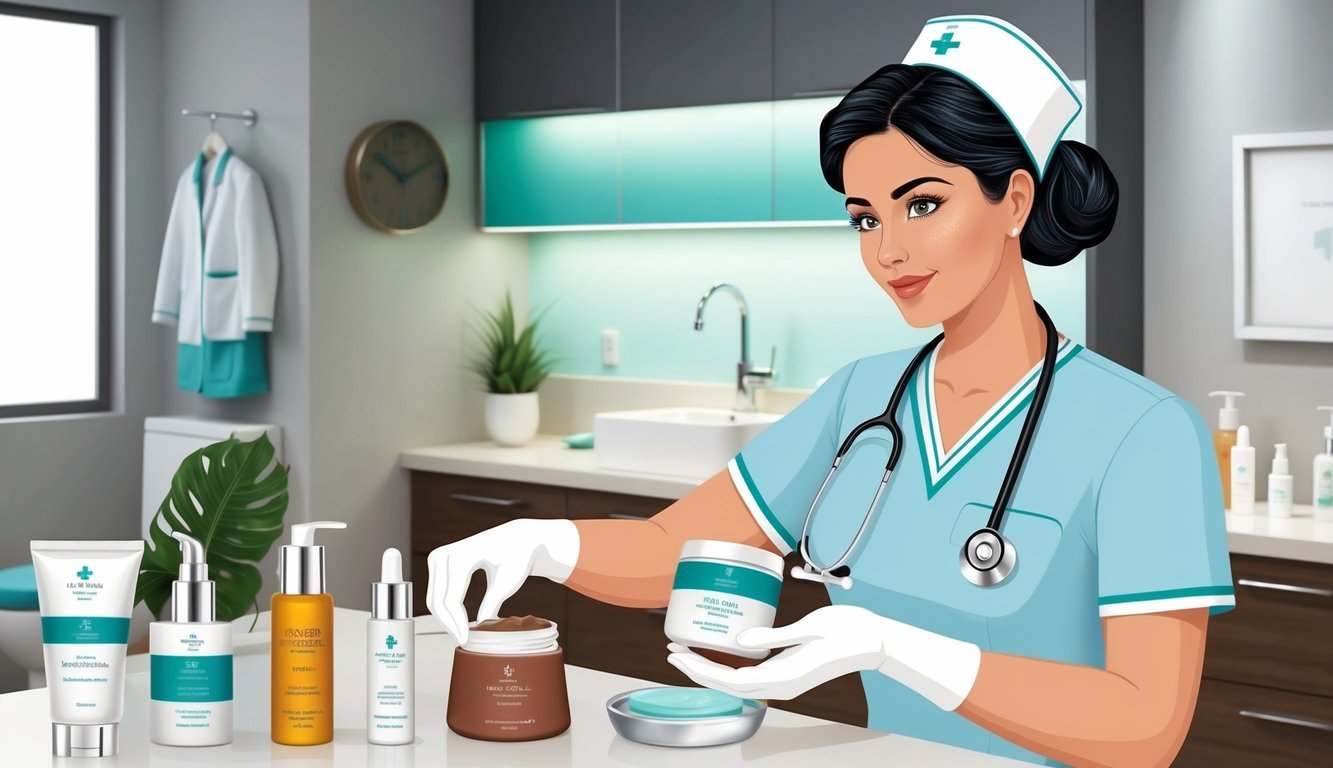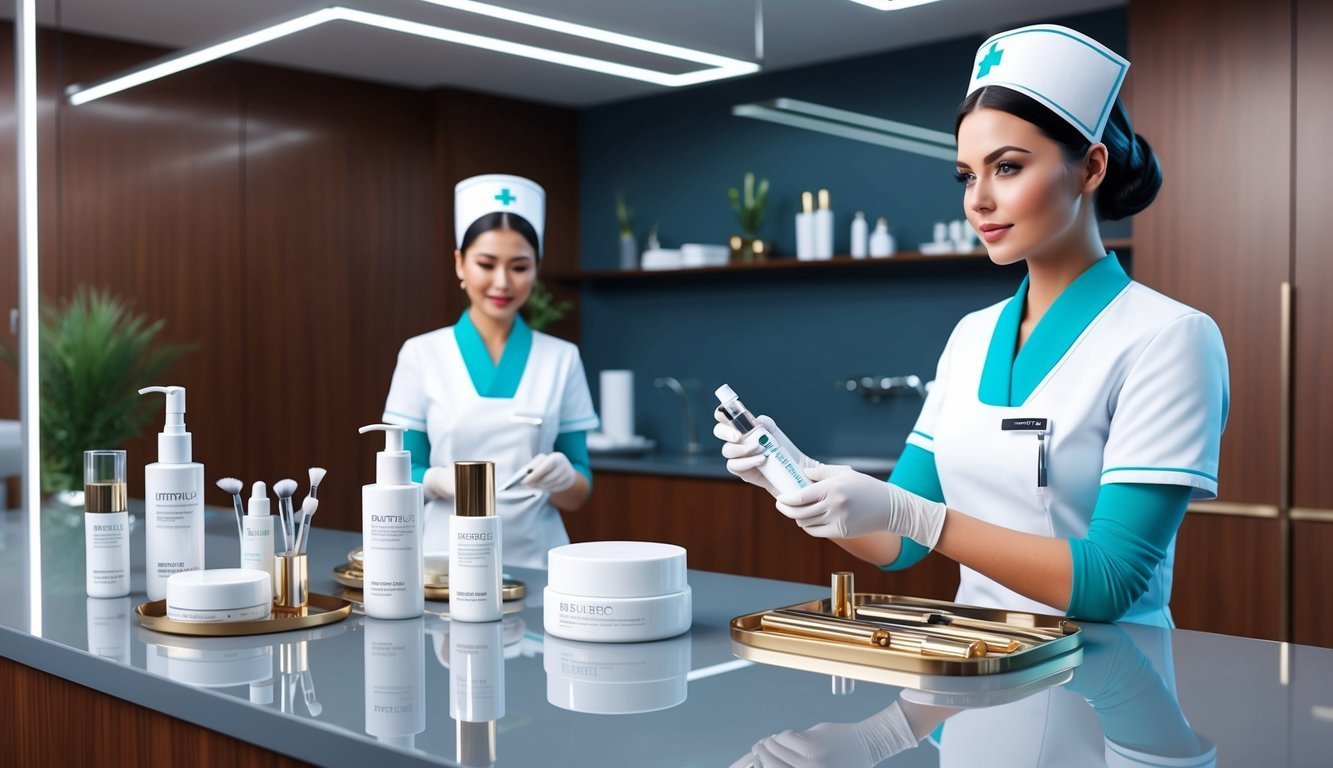As an aesthetic nurse, you are entering a rewarding and specialized field within the healthcare sector.
Aesthetic nurses typically earn $70,000 to $100,000 annually.
However, this amount depends on factors such as experience, location, and work setting.
This lucrative salary reflects the increasing demand for professionals skilled in cosmetic procedures and non-surgical treatments.
Aesthetic nursing not only offers competitive pay but also provides a chance to work closely with patients, enhancing their confidence and appearance.
By understanding the salary landscape and how it varies by state and experience, you can better navigate your career path and make informed decisions.
For more detailed insights, check out resources like NursingProcess.org’s salary breakdown and Indeed’s guide on becoming an aesthetic nurse.
Investing in your education and certification can further elevate your earning potential.
By staying informed about the industry’s trends and salary expectations, you can strategically position yourself within the aesthetic nursing field, ensuring a fulfilling and financially rewarding career.
Understanding the Role of an Aesthetic Nurse

Aesthetic nurses play a crucial role in providing patient care focused on cosmetic procedures.
Their responsibilities span various tasks, from administering treatments to assisting in aesthetic surgeries.
The knowledge and qualifications required for this role are essential for ensuring effective and safe patient outcomes.
Core Responsibilities
As an aesthetic nurse, your core responsibilities include administering various cosmetic procedures such as Botox injections, dermal fillers, and chemical peels.
You also perform skin assessments and consultations to understand patient needs and expectations.
In addition to these tasks, you provide pre- and post-operative care for patients undergoing surgical procedures.
Educating patients about treatment options and possible outcomes is vital.
Furthermore, you must maintain accurate records of treatments administered and monitor patient progress.
Compliance with safety protocols and understanding the latest techniques in aesthetic medicine are essential for delivering high-quality care.
Work Environments
Aesthetic nurses typically work in diverse environments, including medical spas, dermatology clinics, and plastic surgery centers.
Many aesthetic nurses collaborate with plastic surgeons and dermatologists, assisting them during procedures and consultations.
This teamwork is crucial for providing comprehensive care.
Opportunities also exist in private practices, where you may work independently.
The atmosphere can vary greatly, from the clinical feel of a hospital to the relaxing environment of a spa.
Each setting requires you to adapt your skills and approach to patient care effectively.
Qualifications and Certifications
To become an aesthetic nurse, you need to first complete a registered nursing (RN) program, which includes passing the NCLEX-RN exam.
After obtaining your RN license, additional training specific to aesthetic nursing is crucial.
Certain certifications enhance your qualifications in this field.
The Certified Aesthetic Nurse Specialist (CANS) designation signifies your expertise in aesthetic practices.
Additionally, pursuing certifications from the Plastic Surgical Nursing Certification Board can expand your knowledge and career opportunities.
Staying updated with new trends and techniques through continuing education is vital for maintaining certifications and providing the best patient care.
Qualification Pathways for Aesthetic Nurses
Aesthetic nursing requires a blend of formal education, specialized training, and certification.
Understanding these pathways can help you navigate your career and enhance your qualifications in this specialized field.
Educational Requirements
To become an aesthetic nurse, you must first earn a nursing degree.
Most aesthetic nurses hold an RN degree, which provides foundational knowledge in patient care.
Some may pursue a Master of Science in Nursing (MSN) for advanced practice roles, enhancing your understanding of clinical guidelines and patient management.
You can also consider pursuing additional degrees focusing on aesthetic practices.
This educational background is crucial, as it equips you with the necessary clinical skills to perform cosmetic procedures safely and effectively.
Specialized Training
After obtaining your nursing degree, specialized training in aesthetic procedures is essential.
Many employers prefer or require candidates to complete programs focused on aesthetic nursing.
These may include training in procedures such as:
- Botox administration
- Dermal fillers
- Laser treatments
Courses often provide hands-on experience, ensuring you gain practical skills alongside theoretical knowledge.
Look for training programs accredited by recognized institutions, so you receive quality education that meets industry standards.
Certification Process
Obtaining certification can enhance your professional credibility.
Consider becoming a Certified Aesthetic Nurse Specialist (CANS), which demonstrates your expertise and commitment to the field.
To qualify, you need:
- A current RN license
- A minimum of two years of clinical experience
- Completion of specified aesthetic training
Additionally, some choose to pursue certifications like Certified Plastic Surgery Nurse or Dermatology Nurse Certified (DNC).
Each certification has its requirements, including continuing education credits.
Keep track of your professional development and ensure you meet the criteria for maintaining your certification.
Participating in ongoing education is vital, as aesthetic practices frequently evolve.
Staying current in the field will not only solidify your expertise but also improve your job prospects and salary potential.
Financial Aspects of Aesthetic Nursing
Understanding the financial landscape of aesthetic nursing is crucial for those considering this career.
This field offers competitive salaries, influenced by various factors such as location, experience, and specialization.
Salary Data Analysis
The average aesthetic nurse salary in the United States is approximately $80,321 annually, translating to about $39 per hour.
According to the Bureau of Labor Statistics (BLS), the median salary for all nurses is higher, at around $86,070 annually, or $41.38 per hour.
Aesthetic nurses in states like California can earn significantly more, with reported figures of $150,160 per year or about $72.19 per hour.
Detailed salary figures can vary widely depending on experience and specific roles within the field.
| State | Average Hourly Wage | Annual Salary |
|---|---|---|
| California | $72.19 | $150,160 |
| Colorado | $46.88 | $97,510 |
| National Avg | $39.00 | $80,321 |
Factors Influencing Earnings
Several factors influence the earnings of aesthetic nurses.
Geographic location is one of the most significant.
States with higher costs of living, like California and New York, typically offer higher wages.
Experience and specialization also play a vital role.
More experienced nurses or those with additional certifications may command higher salaries.
Additionally, the type of facility where you work can impact earnings. Private clinics may offer different compensation packages than larger hospitals.
Benefits, such as overtime pay and bonuses, can also augment your earnings significantly.
Higher Pay Opportunities
To increase your earning potential as an aesthetic nurse, consider pursuing advanced certifications or specializations in high-demand areas.
Roles that require specialized skill sets often yield higher salaries.
Some facilities may offer sign-on bonuses or commission-based pay for services rendered.
This can lead to earnings well above average.
It’s also worth exploring opportunities in areas known for higher demand, which may provide more lucrative positions.
The potential for overtime shifts and weekend pay differentials can greatly enhance your income as well.
Career Advancement in Aesthetic Nursing

Advancing your career as an aesthetic nurse involves pursuing additional specializations, collaborating effectively with other medical professionals, and engaging with professional organizations.
Each pathway can enhance your skills, network, and opportunities in the field.
Further Specializations
To elevate your expertise, consider pursuing further specializations within aesthetic nursing.
Areas such as injectables, laser therapy, and advanced skin care practices can set you apart.
Certifications from recognized institutions can enhance your qualifications.
For example, programs offered by the American Association of Aesthetic Medicine and Surgery or the International Society of Plastic and Cosmetic Nurses provide valuable training.
Additionally, gaining experience in subfields like dermatology can enhance your ability to work with patients who require specific aesthetic procedures.
This could involve further education, such as obtaining a certification in dermatology from the Dermatology Nurses Association.
Staying updated on core competencies is essential for maintaining a competitive edge.
Relationship with Other Medical Professionals
Building relationships with plastic surgeons and dermatologists is vital for career advancement.
Collaborative practices often lead to referrals and shared learning opportunities.
Engaging physicians in discussions about potential treatments can enhance patient care and open up new avenues for employment.
You may also consider forming alliances with professionals specializing in cosmetic procedures.
Attending conferences and networking events fosters connections that can lead to mentorship opportunities.
By establishing a supportive professional network, the chances of collaboration on complex cases increase, enriching your practice and broadening your knowledge base.
Associations and Professional Organizations
Joining associations can provide you with resources that promote career growth.
Organizations like the American Association of Aesthetic Medicine and Surgery and the International Society of Plastic and Cosmetic Nurses offer educational resources, networking events, and advocacy efforts.
Membership provides access to exclusive seminars, workshops, and the latest research in aesthetic practices.
Being a part of these communities also demonstrates your commitment to the field, enhancing your professional credibility.
You gain insights into emerging trends, which can inform your practice and keep you connected to industry advancements.
Scope of Services and Procedures

Aesthetic nurses play a crucial role in delivering a variety of cosmetic services and procedures aimed at enhancing patients’ appearance.
These offerings frequently range from skin rejuvenation techniques to non-surgical body contouring treatments.
Skin Rejuvenation and Cosmetic Techniques
You can expect aesthetic nurses to perform a variety of skin rejuvenation treatments.
Common procedures include chemical peels, which improve skin texture and tone, and laser treatments that target pigmentation and vascular lesions.
Injectables like Botox and dermal fillers are also significant parts of their toolkit.
Botox temporarily reduces the appearance of fine lines and wrinkles, while fillers restore volume to areas like cheeks and lips.
Many aesthetic nurses work in medical spas, where they may also offer tattoo removal and hair removal services.
| Procedure | Purpose |
|---|---|
| Chemical Peels | Improve skin texture and tone |
| Laser Treatments | Target pigmentation and lesions |
| Botox | Reduce fine lines and wrinkles |
| Dermal Fillers | Restore volume in facial areas |
Body Contouring and Non-Surgical Treatments
Non-surgical body contouring options are a specialty of aesthetic nurses.
They use techniques like CoolSculpting and Ultrasound therapy to reduce fat without surgery.
These procedures are popular among those who want effective yet less invasive methods to enhance their body shape.
Aesthetic nurses also administer body treatments that focus on skin tightening and improving skin appearance.
Many clients choose these options for a more sculpted look without the downtime associated with plastic surgery.
| Treatment | Benefits |
|---|---|
| CoolSculpting | Non-invasive fat reduction |
| Ultrasound Therapy | Skin tightening and rejuvenation |
| Non-surgical Lifts | Enhance natural facial contours and volume |

